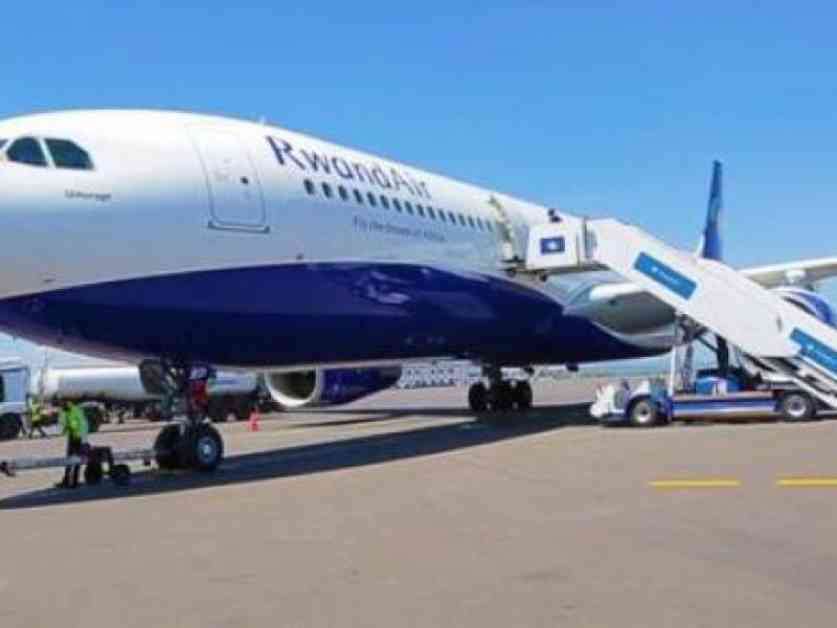RwandAir Forced to Alter Flight Paths Amid DRC Airspace Closure
RwandAir, the national airline of Rwanda, made a significant announcement on Wednesday, February 12, 2025, regarding the redirection of its flight routes. In response to the Democratic Republic of Congo’s decision to prohibit the overflight of its territory by any aircraft registered or based in Rwanda due to its military and logistical support of the M23 rebellion, RwandAir took action to ensure the safety and efficiency of its affected flights while minimizing disruptions for passengers.
According to a statement released on RwandAir’s official communication platform, the airline expressed regret for any inconveniences caused by the airspace closure and advised customers to monitor their website and social media channels for updates. Additionally, passengers were encouraged to reach out to their local RwandAir office with any inquiries.
The closure of Congolese airspace to Rwandan-registered aircraft stemmed from the deadly violence that resulted in the loss of at least 3,000 lives and left over 2,000 injured during clashes for control of Goma, the capital of North Kivu province. The conflict unfolded between the Armed Forces of the Democratic Republic of Congo and the M23 rebellion, supported by Rwanda.
This ban, as mandated by Congolese aviation authorities, was a direct response to the insecurity arising from the armed conflict in the region. The decision not only prohibits the overflight but also prohibits any Rwandan-registered or Rwanda-based aircraft from landing on Congolese territory, as outlined in an internal communication from Congolese authorities cited by ACP.
The timing of this measure coincides with ongoing tensions between Kinshasa and Kigali. Diplomatic efforts are underway to address the current security crisis following the occupation of Goma by the M23-AFC-RDF coalition. Despite calls for a ceasefire, reports of violent clashes persist in the South Kivu province.
Expert Insights on the Impact of Airspace Closure
Amidst these developments, aviation experts have highlighted the far-reaching implications of the DRC airspace closure on RwandAir’s operations. The rerouting of flights, while necessary for safety reasons, poses logistical challenges for the airline and its passengers.
In an interview with a renowned aviation analyst, the expert underscored the complexities involved in managing such airspace restrictions. “The closure of airspace due to political conflicts not only disrupts flight schedules but also adds significant costs to airlines like RwandAir,” the analyst stated. “It requires meticulous planning and coordination to navigate alternative routes while ensuring minimal disruptions to passenger travel.”
Furthermore, the expert emphasized the critical role of diplomacy in resolving airspace disputes between neighboring countries. “Efforts to de-escalate tensions and find peaceful resolutions are essential to restoring normalcy in the region and safeguarding the aviation industry’s integrity,” the analyst added.
The Human Toll of Conflict and Airspace Restrictions
Beyond the logistical and diplomatic ramifications, the human impact of the conflict and airspace restrictions cannot be overstated. The loss of lives, displacement of communities, and disruption of essential services in conflict-affected areas underscore the urgent need for sustainable peace-building efforts.
As a Rwandan national residing in a region affected by conflict, I have personally experienced the disruptions caused by airspace closures and heightened tensions between neighboring countries. The uncertainty and fear that accompany such situations highlight the fragility of peace and the importance of dialogue and cooperation in preventing further escalation of violence.
In conclusion, the closure of DRC airspace to RwandAir serves as a sobering reminder of the interconnectedness of global events and the need for collective action to address conflict-related challenges. As stakeholders work towards resolving the underlying issues fueling tensions in the region, the aviation industry must adapt to navigate these turbulent times while prioritizing the safety and well-being of passengers and crew.

















